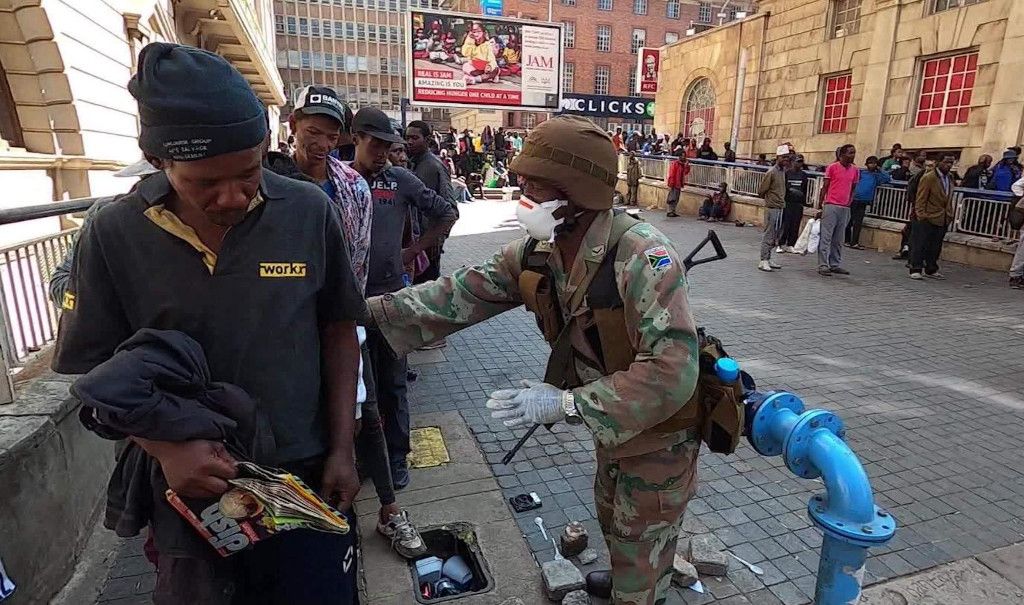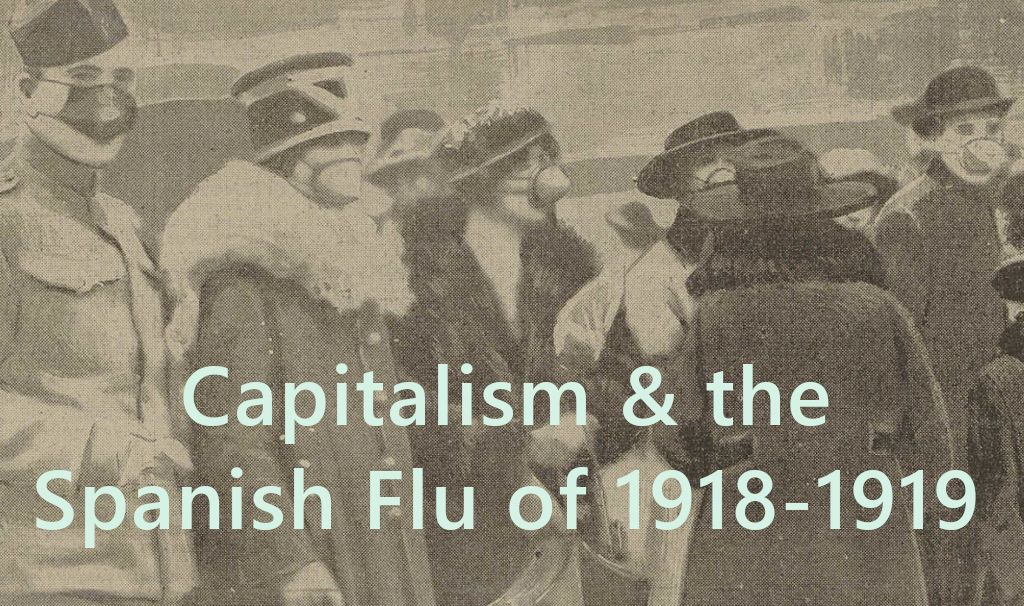Carmia Schoeman and Mametlwe Sebei are members of the Workers’ and Socialist Party (ISA in South Africa).
Lockdown measures surpass those of 1987 Apartheid state of emergency
South African president Cyril Ramaphosa announced on March 23, that the government’s “state of disaster” restrictions would be escalated to an unprecedented lockdown of the whole country. The sweeping measures that have followed, with far-reaching restrictions on movement and public activities, surpass those of the 1987 state of emergency under apartheid in both severity and intrusion on ‘civil liberties’.
Since March 27, the lockdown has prohibited any movement outside private dwellings except for buying food or emergency treatment, and only traveling of workers in sectors deemed “essential”: healthcare, food industry, emergency and transport services amongst others. The country has been effectively shut down and so too the majority of the industries across the economy. With all but a few key sectors of the economy placed in ICU, the economic downturn is a certainty. The only question is how long and how severe will it be?
A healthcare system on brink of collapse
South Africa suffers from a two-tier healthcare system, where 16% of the population has access to a private system through private insurance that spends Rand 11,390 ($600) per person annually, compared to the vast majority (84%) of the population allocated R1,880 ($100) per person in the public healthcare sector. In addition to this, only 21% of the country’s doctors are found in the public medical facilities. With this harsh reality in mind, combined with a growing population and wasteful allocation of the healthcare budget towards ever-increasing bloated administrations, it is no wonder that the 813 ICU beds in public hospitals (of which less than 10% are isolation appropriate) are running at 95–100% capacity in ‘normal’ times.
In ‘normal’ — that is to say pre-COVID19 — times, South Africa is waging an epidemiological war against HIV/AIDS, which accounted for 126,755 (25% of total) deaths in 2017, as well as Tuberculosis (TB) — where 66% of the 300,000–500,000 annual active cases are also HIV positive. A study of ICU beds in eThekwini Health District, published in 2017, revealed that the majority of both public and private ICU facilities did not comply with adequate spacing between beds — a crucial measure in preventing spread of infection.
The challenges facing South Africa due to its woefully under-resourced and overburdened healthcare system will be put to further stress tests as we face shortages of medical, health and safety supplies across the world. Confronted with the reality of overcrowded living conditions, a complete lack of service delivery — including essential sanitation like clean running water and flushable toilets, some of the world’s highest rates of immuno-compromising conditions such as HIV, TB, hypertension, diabetes, and malnutrition — the state’s implementation of a strict lockdown has been navigated with little thought.
Monday March 23 until Friday March 27, saw an immense mobilisation of people in South Africa flooding not only the shops for essentials, but overcrowded public transport — with many fleeing the urban centres to their rural village homes and families, where only skeletons of healthcare provision remain. It is almost certain that we can expect a surge in infections due to these concentrated mass gatherings of people, and that COVID-19 will spread to vulnerable rural areas due to the recklessness of the state’s actions regarding this lockdown. However, we might only start seeing this in the form of body counts as opposed to infection counts, due to our dismal prospects regarding proper testing.
With only 6 active testing laboratories, the current stats on infections are in no uncertain terms, skewed. A backlog of more than 5,000 tests was confirmed on March 26, with MEC of Health admitting that many private labs are unable to trace the patients who tested positive let alone their contacts — another strong indictment of the so-called efficiency of privatization and vilification of the global capitalist system. How the roll-out of mass testing in “at risk” communities promised by the state will impact the data and containment of COVID-19 remains to be seen. The economic fallout of this pandemic, however, is just entering its incubation period.
A blow upon blows for the economy
South African capitalism has never fully recovered from the 2008/9 Great recession, never returning to the growth levels of the 2002–2007 boom years. The last quarter contraction was accompanied by a jobs bloodbath, which is bound to push the economy further into crisis. The decrease in SA’s full-time labour force was due to job losses in mining (-15,000), construction (-13,000), manufacturing (-5,000), transport (-2,000) and electricity (-1,000) in the fourth quarter of 2019. Job losses in most industries were offset, in part, by the rise in employment in the trade industry. But trade has now been brought to a halt by stringent restrictions on international and domestic trading and traveling, closure of ports, and other measures imposed to slow down the contagion of COVID-19. South Africa already entered economic recession months before the first case of COVID-19 infection was confirmed here.
Due to the uneven and combined development of its economy, which blends backwardness with monopoly industries highly integrated in the world market, South Africa is extremely vulnerable to the global crisis. Sixty percent of the GDP is trade, mostly with China, US, and Europe, the epicentres of the pandemic. Economists estimate that for every percentage lost in the Chinese economy, 0.2% is shaved off from South Africa’s. The 6% contraction projected for the Chinese economy will be a crushing blow to South African exports — especially the mining industry, which makes up one third of South Africa’s R323 billion ($17.1 billion) in exports to China. Closure of manufacturing plants, travel bans and other lockdown measures in China will hit South Africa’s import industries like mobile phones, which receives 85% of its supplies from China.
Tourism has been the most consistently growing industry, contributing R426 billion ($22,37 billion) or 8.6 % of the GDP in 2018 and has become a major earner of foreign currency. Analysts suggest that a contraction of only 25% of the tourism industry, based on the most optimistic scenario — assuming bans on international travel to South Africa are lifted in a few weeks — would result in a R35 billion ($1.84 billion) reduction in foreign currency earnings. The industry employs 1.5 million people who mostly live from hand to mouth, many surviving on tips. These workers are currently receiving no income and face uncertain futures conditional on the duration of the pandemic, its impact, and government bailouts. Unfortunately this is also the reality for many precarious workers in irregular contract work and street traders, who are estimated to lose R2.437 billion in the 21 days lockdown alone.
These conditions, along with losses of exports of minerals, manufacturing and agricultural products, will be devastating, not only for the balance of trade but also on the exchange rates. The South African rand, already under tremendous pressure before the downgrade of the country’s foreign debts and banks to junk status, plunging to new depths. Contrary to the bourgeois economic orthodoxy, the collapse in the value of rand will not boost exports, and a free fall in the South African rand will mean skyrocketing inflation, increased costs of living and other catastrophic consequences for the masses.
Combined with business bankruptcies, plummeting government revenue collections and a growing budget deficit, we can expect a jobs bloodbath in the hundreds of thousands, if not millions to add to the 10.3 million unemployed and discouraged job-seekers. The CEO of Edcon, SA’s largest clothing retailer has already signalled it might not open its doors after lockdown, not to mention the mass retrenchments looming in mining and manufacturing. The levels of poverty and hunger will reach catastrophic levels, in a situation where government will be pressured to implement an austerity program to reign on the unsustainable growth in public debt, which has now surpassed R3 trillion ($158 billion) and will worsen in the coming months as the economy declines further and government spending on measures to contain the Covid-19 pandemic increases astronomically.
SARS’s dismal tax-revenue collection falling R66.2 billion ($3.6 billion) short of target, was a tipping point in the government’s political declaration of open class war against the working class expressed in the 2020 budget. It entails the most brutal cuts in public services and spending totalling R260 billion ($13.7 billion) including cuts to essential public services like housing, education, transport and health, adding to the burden of public healthcare workers on the front line of the Covid-19 pandemic.
State-sanctioned repression — including the killing of eight people and countless instances of xenophobic attacks on foreign small shop owners at the hands of the police to date, the handover of cellphone location data by telecoms companies to the state, banning of alcohol and cigarette sales — has been counterposed with measures welcomed by “left economists” such as price controls and using the unemployment insurance fund (UIF) to bail out businesses to pay their workers during lockdown. They also want to urge the government to spend more to stimulate the economy. Although these measures may come as a welcome short-term relief to desperate workers, they foster dangerous illusions in the possibility of peaceful, social reforms in the period of economic decline and encourage a blind faith in the bourgeois state in midst of a class war. Unfortunately, these ideas have been uncritically accepted by organised labour including the South African Federation of Trade Unions (SAFTU), which performed miserably in the initial tests imposed on it by the Corona crisis.
The disease of capitalism
It is either capitalism or the working class that gets served. This is the burning question of struggle, which the living forces will settle — not gently by arguments or reforms, but by bloody struggles which the ANC government is preparing for by rolling out the military occupation of the country and imposing draconian measures under the pretext of fighting the pandemic.
Far-reaching measures are absolutely essential to combat the pandemic and the impending economic catastrophe. The aggressive lockdown imposed is an admission from the ANC government that the social systems in place, including the mere remnants of a completely gutted healthcare system, cannot weather a pandemic of the proportions seen in China, Italy, Spain, etc. And, ultimately, the ANC government is incapable of undertaking the measures needed, including expropriation of the private health and hospitality industry as well as the R1.4 trillion cash hoarded by the big corporations to marshal the resources necessary both to fight the pandemic now, and getting set to stand up to coming pandemics and the climate crisis by investing in building hospitals, houses and schools and creating sustainable jobs.
They should be imposing capital controls, nationalising the banks, bankrupt industries and other key industries to save jobs, and roll-out a public works program to build public infrastructure, improve service delivery and end unemployment. However, confined to their framework of a capitalist system, they are left to choose between masses of working class and poor dying of COVID-19 now, or starvation later.



